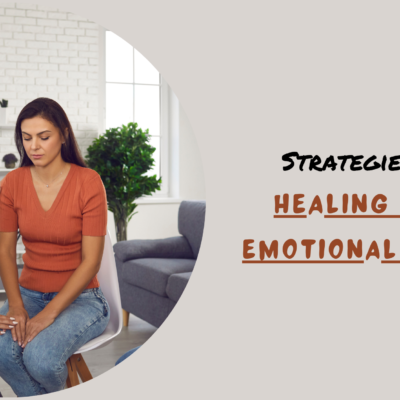Strategies for Healing After Emotional Abuse: Emotional abuse can leave deep scars that are not always visible to the naked eye. Unlike physical wounds, the bruises from emotional abuse can stay long after the abusive relationship has ended. Recovery from emotional abuse is a complicated journey that needs time, patience, and self-compassion.
If you have experienced any kind of emotional abuse, here I have bought some good news for you, know that healing is possible. So, without any delay let us talk about such 10 points that will help you to deal with emotional abuse.
Also Read:
- Creative Eating Disorder Solutions to Try.
- Benefits of Walking in Nature on Mental Health.
- How to Get Mind to Stop Racing?
- So Bored with Life? Here’s What You Need to Know.
- Signs You Have Working From Home Depression.
Strategies for Healing After Emotional Abuse:
Acknowledge Your Experience
The first step towards healing from emotional abuse is recognizing that you were certainly abused. It’s standard for survivors to downplay their experiences or blame themselves for the abuse. However, it is important to identify that emotional abuse is never justified and that you deserve to be treated with respect and kindness. By recognizing the abuse, you can begin to validate your feelings and experiences.
Ask for Support
Healing from emotional abuse can be a daunting task, but you don’t have to go through it alone. Reach out to friends, family members, or a therapist who can offer you support and guidance. Talking to someone who understands what you are going through can provide validation and help you feel less alone. Support groups for survivors of emotional abuse can also be useful resources for connecting with others who have faced similar experiences.
Set Boundaries
One of the most essential steps in healing from emotional abuse is learning to set boundaries. Abuse usually includes the violation of boundaries, so it’s important to set clear limits to protect yourself from further harm. Practice saying no to things that make you uncomfortable and prioritize your requirements and well-being. Setting boundaries may feel challenging at first, but with time and practice, it can become easier.
Practice Self-Care
Self-care is important for healing from emotional abuse. Make time for activities that nourish your mind, body, and soul, whether it’s taking a relaxing bath, going for a walk in nature, or indulging in a hobby you enjoy. Concentrate on activities that encourage self-love and self-compassion. Remember that you deserve to prioritize your well-being and happiness.
Challenge Negative Beliefs
Emotional abuse can leave survivors with deep-seated harmful beliefs about themselves, such as feeling unworthy or unlovable. Challenge these beliefs by developing self-compassion and practicing positive self-talk. Remind yourself of your strengths and achievements, and challenge the critical voice in your head that echoes the abuser’s hurtful words. Affirmations and journaling can be helpful means of redirecting negative thought habits.
Educate Yourself
Understanding the dynamics of emotional abuse can be empowering and validating. Educate yourself about the signs of emotional abuse, the cycle of abuse, and the impact it can have on survivors. Knowledge is a powerful tool for breaking free from the cycle of abuse and rebuilding your sense of self-worth. Books, articles, and online resources can provide useful insights and information.
Focus on Forgiveness
Forgiveness is usually a challenging aspect of healing from emotional abuse. It’s essential to clarify that forgiveness does not mean excusing or favoring the abuser’s behavior. Instead, forgiveness is about releasing the anger and bitterness that may be keeping you back from moving forward. Forgiving the abuser is a process that takes time and may not happen overnight. Concentrate on forgiving yourself for any perceived mistakes or shortcomings instead.
Cultivate Healthy Relationships
Building healthy relationships with supportive and caring people is an important part of the healing process. Surround yourself with people who uplift and empower you, and avoid those who bring negativity or toxicity into your life. Healthy relationships are established on mutual respect, trust, and communication. Concentrate on nurturing connections that contribute to your well-being.
Practice Mindfulness
Mindfulness can be a powerful tool for healing from emotional abuse. By practicing mindfulness, you can learn to stay present at the moment and develop self-awareness and compassion. Mindfulness techniques such as deep breathing, meditation, and body scanning can help relieve stress and anxiety and encourage emotional healing. Include mindfulness in your daily routine to support your journey towards healing.
Be Patient with Yourself
Healing from emotional abuse is a process that takes time, and it’s important to be patient and gentle with yourself along the way. Allow yourself to feel and process your emotions without judgment, and identify that healing is not unbent. There may be ups and downs, setbacks and breakthroughs, but know that each step you take toward healing is a success in itself. Celebrate your progress and recognize the strength and resilience it takes to heal from emotional abuse.
At The End
Healing from emotional abuse is a journey that requires courage, resilience, and self-compassion. By adopting the above-mentioned points in your life, you can begin to reclaim your sense of self and rebuild your life on your terms. Remember that healing is possible, and you deserve to live a life free from abuse and filled with love, joy, and fulfillment.








